Deborah J. Ross's Blog, page 64
June 28, 2019
Short Book Reviews: Death Stalks a Killer
Cruel Fate, by Kelley Armstrong (Subterranean)
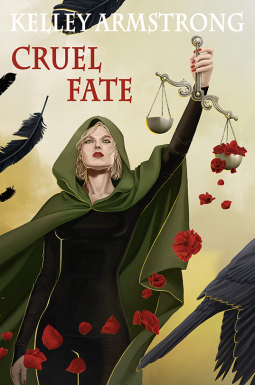 I loved Kelley Armstrong’s previous “Cainsville” novella, Rough Justice, which was my introduction to her work. In the small town of Cainsville, outside Chicago, fae have made a home, as secure as any in the modern world. The central characters, Olivia, her boyfriend, attorney Gabriel, and her former boyfriend and biker, Ricky, are incarnations of characters from Welsh legend, most notably in their participation in the Wild Hunt, that infallible instrument of fatal justice against the guilty. Both novellas combine mystery, drama, and evolving relationships in a highly satisfying way.
I loved Kelley Armstrong’s previous “Cainsville” novella, Rough Justice, which was my introduction to her work. In the small town of Cainsville, outside Chicago, fae have made a home, as secure as any in the modern world. The central characters, Olivia, her boyfriend, attorney Gabriel, and her former boyfriend and biker, Ricky, are incarnations of characters from Welsh legend, most notably in their participation in the Wild Hunt, that infallible instrument of fatal justice against the guilty. Both novellas combine mystery, drama, and evolving relationships in a highly satisfying way.In Cruel Fate, Olivia’s father has just been released from prison, exonerated as a serial killer. He’s not entirely innocent, however, having murdered the real serial killer. Now someone’s after him, and it’s up to Olivia and Gabriel to find out who and why before her father becomes a victim, himself.
One problem I had with the previous book was the slowly evolution of the relationships, but reading a second novella gave me perspective and pacing. While both can be read as stand-alones, I found a deeper enjoyment in seeing self-discovery and progressive mutual understanding while a dramatic mystery unfolds. The good news is that there are a whole bunch of these stories. Now I want to go back to the beginning and read them all.

Published on June 28, 2019 01:00
June 26, 2019
Today's Moment of Art
Published on June 26, 2019 01:00
June 24, 2019
How I Wrote A Star Wars Story (and got paid for it)
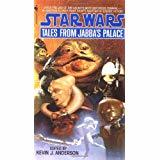 One of the most fun writing projects I ever participated in was the second Star Wars anthology,
Tales From Jabba's Palace
. At the time I was invited, my first novel, Jaydium, had recently been released and I had a handful of professional-market short story sales to my credit; I was writing then as Deborah Wheeler. I met the editor, Kevin J. Anderson, at a convention.
One of the most fun writing projects I ever participated in was the second Star Wars anthology,
Tales From Jabba's Palace
. At the time I was invited, my first novel, Jaydium, had recently been released and I had a handful of professional-market short story sales to my credit; I was writing then as Deborah Wheeler. I met the editor, Kevin J. Anderson, at a convention.Kevin had just started reading Jaydium and was impressed enough to think, "Aha! This is just the writer I'm looking for to fill one of the remaining anthology slots." Once he explained that this would be work-for-hire and subject to the approval of Paramount Studios and I'd signed a bunch of forms, we got to work.
Kevin wanted a "braided" anthology, with stories intersecting and overlapping as much as possible. Each author got a different minor character who worked or lurked in Jabba's Palace. Some were described in "the bible" from the movie, but a few were original (like Barbara Hambly's cook, for every gangster needs his own chef). Every story had to include a scene from the movie, as well. We were each asked to circulate an outline of our story to all the other authors and then to correspond with one another on details.
Since I joined the anthology team late, I didn't have much choice of character. I got "Ree-Yees," the three-eyed, goat-headed fellow hovering around the opening scenes. The reference materials said he was not very bright and usually drunk. Okay, I thought, I can have fun with that. Kevin suggested that, in addition to the usual scheming and rivalry among Jabba's underlings, the Empire itself might have reason to get rid of Ree-Yees.
Here's what I sent to the other writers:
Ree-Yees story synopsis
Background: Ree-Yees, exiled from his home planet for murder, has been recruited by the Empire to assassinate Jabba the Hutt in exchange for amnesty. Parts for the bomb which Ree-Yees is to plant on Jabba's sail barge have been smuggled in through the kitchen in shipments of goatgrass. Ree-Yees is particularly anxious about the shipments because an earlier one disappeared, just before Jabba suffered such a bad bout of indigestion that he now suspects the cook of trying to poison him. Jabba has his own uses for Ree-Yees: shortly after Ree-Yees's arrival at the Palace, Jabba had him drugged and implanted with a very-short-range bomb and a posthypnotic detonation command, thus rendering Ree-Yees a sort of kamikaze assassin.
After the arrival of the strange droids, Ree-Yees takes advantage of the disruption to sneak away, bearing a bucket of Jabba's leavings for the frog-dog tethered outside. Checking the receiver concealed in a false wart, he learns that the final component of the bomb -- the detonator -- would arrive that night.
Ree-Yees creeps into the kitchen, only to find the detonator gone and the scullion dead. Before Ree-Yees can remove the body and pin the murder on someone else, a Gamorrean guard stumbles in, hoping for a late night snack. Ree-Yees spins a patently ridiculous story, which the guard believes, carrying away the body to begin his own investigation.
Ree-Yees, stunned and relieved, downs his entire flask of Sollustan gin and wavers off. Visions come to him, the same ones which have plagued his drunken dreams -- visions of an icy plain, a forest world -- and his own home planet. Too drunk to realize what he is doing, Ree-Yees follows these visions to their source, a room deep within the labyrinth of tunnels, where the surgically removed brains of the B'morr monks generate powerful telepathic emanations. Ree-Yees receives an overwhelming image of fire, which he takes to mean he will ultimately succeed in his mission.
On board the sail barge the next morning, all hell breaks loose. Leia springs into action, throttling Jabba with her chains. In desperation, Jabba struggles to utter the detonation command. Ree-Yees feels the compulsion, starts to draw closer. Through his drunken stupor, he instinctively senses that if he does, he will never see his home again. He resists -- feebly, but just long enough for Leia to finish Jabba off.
As soon as Leia leaves, Ree-Yees starts scheming how he will convince the Empire he killed Jabba. Everything is turning out better than he hoped. Maybe he will be able to take over part of Jabba's business from his home planet.
He remembers the monks' vision of engulfing flames a moment before the sail barge explodes.
As it happened, I knew the writers who were handling the Gamorrean guard (William F. Wu) and the chef (Barbara Hambly). Note that the chef was not part of my original plan. His role emerged when Barbara read my outline. We talked on the phone and by email, and I wrote the scene in which Ree-Yees discovers Porcellus the cook, standing over the body of the scullery boy.Barbara came up with the next part, where Porcellus, who's already in fear of his life because of Jabba's previous bout of indigestion, yelps, "I had nothing to do with it!" Then Bill had the guard, slower of wit, look at the dead body and say something quite incomprehensible but which means, "What's wrong with him?" The ball was now in my court, so Ree-Yees babbles that he found the body somewhere else and brought it to the kitchen to attempt "emergency culinary resuspiration" (the smell of food so ripe it can wake the dead). Gartogg, the guard, then slings the body over his shoulder and spends the rest of his own story carrying it around. I then sent a draft of my story to Bill and Barbara, who wove the scene into their own tales, each time with a different perspective.
Some of the anthology stories didn't overlap at all, but others did to a more minor degree. Often the central character of one story would wander through a scene in another. It was wonderful to get an insider's peek into the creative process of other writers, exchanging comments and drafts of scenes. The experience offered the excitement of collaboration and the autonomy of being a single author. The only thing more fun than writing a story for a braided anthology would be to edit it!
Then came the process of review and approval by Paramount. They liked my concept but made me take out a reference to "the rutabaga god," insisting that the Star Wars universe has no rutabagas. (Apparently it has no ants, either, so they made Barbara change them to "myrmidons" in her SW novel.) Oh, well. They let me keep "emergency culinary resuspiration," so I really had nothing to complain about. I had a wonderful time writing the story and being part of a collaborative creative community. Perhaps that's one of the not-so-secret joys of a shared world.

Published on June 24, 2019 01:00
June 21, 2019
Short Book Reviews: HP Lovecraft Meets Shirley Jackson's Hill House
In the Shadow of Spindrift House, by Mira Grant (Subterranean)
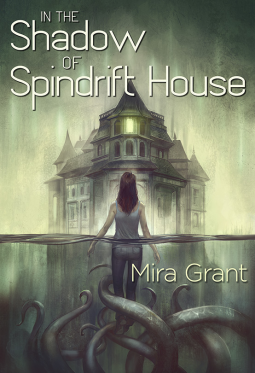
I made my acquaintance of the works of Seanan McGuire through Rosemary and Rue, then the “Incryptid” and “Ghost Roads” series. Mira Grant is Seanan’s horror-writing alias, and I’ve only recently dabbled in her work. Even though horror is not usually my cuppa I’m so glad I did! In the Shadow of Spindrift House is a strange little tale, novella-length if I’m not mistaken, a sort of demented love-child of Shirley Jackson’s The Haunting of Hill House, and the work of H. P. Lovecraft. And a gang of kid ghost-busters, now adults adrift in their own lives.
Spindrift House is haunted; that’s the only thing the denizens of “the half-ruined town of Port Mercy, Maine” can agree on. The land itself is valuable, but the title is clouded, and the documents that would establish claim lie within the strange Victorian edifice. The contesting families have offered a huge reward for the documents, but anyone searching for them must remain for the entire search. So our ghost-busters-now-grown embark upon this treasure hunt.
But the house isn’t safe, and neither is the ocean it overlooks (of course – this is Lovecraft territory, isn’t it?) The imagery shifts from “the sweet, beguiling whisper of the sea” to “the sound of the sea . . . like the beating of some huge, horrible heart” The house, too, is described in spine-chilling terms from “like it’s rotting from the inside out . . . the banister was slick under my fingers, damp with some scentless, unspeakable fluid . . .” “the house was moving in my veins, burrowing into my bones . . .”
The language, with its frequent references to rot and decay, the sense of creeping, nameless horror, are all evocative of Lovecraft’s work, but also Jackson’s psychological thriller, with its slow peeling-away of the veneer of normality and civilization to reveal most uncivilized secrets.
This is a quick read, full of shivery moments. Familiarity with either Lovecraft or Jackson isn’t necessary to enjoy it, although fans of either work will relish the references.
The usual disclaimer: I received a review copy of this book, but no one bribed me to say anything in particular about it. Although chocolates and fine imported tea are always welcome.

Published on June 21, 2019 01:00
June 18, 2019
Free Story on Book View Cafe!
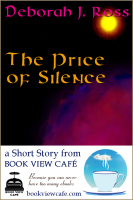 My novelette, "The Price of Silence," is free this month from Book View Cafe. If you've never ordered from them before, the process is simple. You download the file and then side-load it to your reading device. The story is yours permanently that way.
My novelette, "The Price of Silence," is free this month from Book View Cafe. If you've never ordered from them before, the process is simple. You download the file and then side-load it to your reading device. The story is yours permanently that way.Written as the opening to an unpublished novel and later reworked as a stand-alone with a different emotional and moral axis, it appeared in The Magazine of Fantasy and Science Fiction and won Honorable Mention, Year’s Best SF, 2009.
The crew of the spaceship Juno expect to find a fertile planet ready for colonization. Instead, they discover a fiery grave and a space station filled with corpses. What happened here? A natural disaster… or an alien weapon capable of destroying an entire world?
It's also available as an audio book from Audible.

Published on June 18, 2019 01:00
June 17, 2019
[Archives] Deborah Responds to Ads Aimed at Men
 Still relevant, although this blog post dates from 2015.
Still relevant, although this blog post dates from 2015.For various reasons, mostly having to do with the fact that my husband never flies anywhere, he now has a free subscription to a magazine aimed primarily at a male readership. Out of curiosity, I flipped through it. And was suitably amused and horrified. Come with me on an adventure in befuddlement…
Cover: Hmmm, interesting. Think I’ll check it out.
Inside cover. This cloud turns gamers into Titans. I’m anti-interested in “massive universe” games.
This ad for an airline offers drinks on the house (image of man’s hand holding airline-plastic cup of beer). Drinking at altitude is such a colossally bad thing for your hydration, this airline is evil.
Table of contents: Ooh, a person I want to read about.
Ad for men’s eyeglass frames. What were you smoking to think these might make a man look even remotely attractive?
A cancer hospital’s goal is…wait for it…curing cancer.
This ultra-modern watch is ahead of its time. And its face is also unreadable, especially at a quick glance. It’s analog but has no second hand. Why bother?
I think this ad is for a tablet, but I’m not sure. It could be the thing that holds a tablet. The company is marketing to folks who already want their product.
A bluetooth-enabled electric toothbrush. Department of Useless Technology, much? I find an electric toothbrush an improvement over the traditional kind, since I have a touch of carpal tunnel syndrome. I like the little built-in timer. I see no reason whatsoever to have an app that keeps track of how long or how hard I’m brushing.
Finally I come to an actual article! Alas, it is an op ed piece on political and technology. Snooze.
A truly incomprehensible ad about growth, expanding capability without expanding infrastructure. Sounds like a plan to put construction workers out of a job. Zero interest.
The next ad informs me I can roll over my data plan on my smartphone. Since I have a stupid phone, I pass.
Letters to the editor. These are not the droids I’m looking for.
Ad for an intense fragrance for me. Is this why the magazine makes my nose itch?
Another watch, this one with a clear, numbered, analog face. It’s either got a dial to measure seconds or that’s a stop watch. Is there a women’s version for those of us with small hands? Oh, and it says made in USA. I know this because I found the ad interesting enough to read it. Kudos to the company!
An article I might be interested in, only it’s white type on black background and the graphics are unreadable.
Another article on an issue I care about and would to read, only it, too, is illegible white on black.
An ad I believe has to do with day trading. Anti-interest. I have so many and better ways to spend my time than making myself crazy.
Finally, an article I’m interested in and I can read. By this time, I’m on page 26. Alas, it’s followed by an ad for liquor, whiskey I believe, but since I’ve seen far too many lives destroyed by alcoholism, I question the ethics of making liquor appear elegant and attractive.
Another white-on-black article. Drat, one I would have read.
Another watch with an unreadable and terminally ugly face. It’s solar, but what good is that if you can’t read any of it’s 20 functions. Get a sun dial!
Article I could read if I had the slightest interest in it.
Ad for a car I would never own and that probably gets 3 miles per gallon. Trees died for this???
Yet another article I could care less about. Why are these the ones with black on white? Is there an inverse relationship between interest and readability?
An ad for men’s fragrance, featuring a model with great face shape, gorgeous eyes…and a 5 day growth beard that makes me wince. Porcupine time – run away, run away!
Here I gave up. I didn’t even get to the cover story.
It’s a good thing we recycle.

Published on June 17, 2019 01:00
Guest Blog: Barb Caffrey on Writing After Widowhood
"Writing After Widowhood"By Barb Caffrey
A while back, Deborah J. Ross asked me to talk about the differences between writing while my beloved husband Michael was still alive, and writing now. As I've had many years since my husband's unexpected death in 2004 to contemplate this, I agreed to talk about it. Just know in advance that it's not easy, but it is possible. (Spoiler alert!)
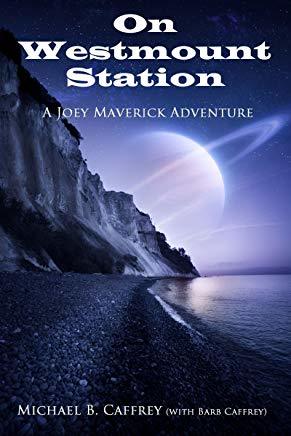 Anyway, when Michael was alive, we wrote some short stories together despite having very different writing styles. We could do this because we'd heard Eric Flint, in 2002, discuss how he collaborated with other authors. It was all about communication, Flint said, “Also, if you could check your ego at the door, that would help immensely.”
Anyway, when Michael was alive, we wrote some short stories together despite having very different writing styles. We could do this because we'd heard Eric Flint, in 2002, discuss how he collaborated with other authors. It was all about communication, Flint said, “Also, if you could check your ego at the door, that would help immensely.”That wasn't all Michael did, mind you. He edited for me, as I edited for him. He and I talked about our stories for many hours a day, every day of the week, a great gift…and he made sure to do all the things a good husband does for his wife without prompting—and without fanfare.
It was because of all of this that I was able to write 230,000 good words in thirteen months back in 2002 and 2003. And into mid-September of 2004, I believe I wrote around 100,000 words, which isn't bad at all when you consider we had a big move across-country and had to find work and lodgings in the process.
Then, disaster struck. Michael died in September of 2004 of four massive heart attacks. He was awake after the first, but before the rescue squad could get to him, he had his second heart attack. He was clinically dead for eighteen minutes, and then was revived at the hospital. He later had heart attacks three and four…within eleven hours of the first heart attack, my beloved husband was gone.
There was absolutely no warning of this.
Not long after my husband died, I moved back to Wisconsin to be closer to my family. I wasn't much good for anyone for several years; I admit this freely. I was in deep shock, and in some ways I never completely came out of mourning. But I was able to write again within a few years, partly because my husband had left behind stories of his own that were unfinished.
To my mind, it was bad enough that my husband was dead. It would be even worse if the stories he'd worked so hard on died with him.
So even though I wrote in a completely different way, and had never written any space opera or military science fiction before (Michael's work mostly straddled those two lines), I decided I was going to finish at least some of his work and put it up for sale on my own. It would allow me to keep at least part of my husband alive, and doing that—even though most of the people around me, including several professional authors, did not believe I should be wasting my effort this way—was my salvation.
Because of that, I kept trying. I also started working, haltingly, on my own stories again. Even though a few of 'em took some dark turns, and I am still unsure to this day if they can be straightened out, getting through that time by being able to write was important.
Note that I had some very supportive friends who encouraged me all the way. A few, I could even “talk story” with…and two of them managed to, between themselves, get me down to the one convention I've been able to go to since my husband's passing, 2005's ConQuesT. I appreciated all of that, and I think all of that, too, was necessary toward me getting back on as even of a keel as I could to write.
But as I started writing again, I realized something. I am a verbal processor. I need to talk my stories out with someone who wants to hear about it. And since Michael died, I really haven't had that. Though I do have some very good friends who will let me bend their ears on occasion, they are working writers. They are doing more in the field than I am currently, and I don't want to be a millstone around their necks.
(And yes, I listen to them. Of course I do. But that's not the point.)
With Michael, I knew if I made mistakes, he'd fix them. Or he'd show me where I'd made mistakes, and I'd fix them myself. I had more confidence in going to write on a day I had little energy (as I have battled lifelong health issues), because if I screwed up on a name or made an unnecessary tense-shift, he'd catch it. So I could relax and create.
Those were the good old days.
But on my own, I have found that I am much more of a perfectionist. My Editor Voice—what I need in my "day job" of editing—never turns off. It's harder for me now to take a chance on a story like my Elfy duology, where I woke up one day with an idea and a character and just let it rip over the next thirteen months, because I don't have anyone here to bounce my ideas off, and I have a lot less confidence in myself than I used to.
There's a reason for that, mind. I managed to get my two Elfy books out there. And I wrote a third book, Changing Faces, that was a major departure for me…but none of them, not any of them, made any dent at all in the marketplace.
Now, do I take all my value from this? Of course not.
But it does make it harder when you're dealing with Life, Interrupted, to sit down and work on something over and over for months on end. It does make it harder to ask writer-friends to listen to something I've written, and give me feedback; if they give too much and it's negative, I shut down, but if they don't give enough, then I wonder if I've done my job.
Maybe you all can relate to this. (I sincerely hope so.)
But I have managed, over time, to be able to write again on my own terms. I write prose notes on a day I have little time for anything other than work or Life, Interrupted; that gives me the ideas I need when I can sit down again and flesh my stories out. I read my stories in progress aloud, because that's the easiest way for me to tell if the flow is right. And I read a lot of esoteric things (one of the books I'm reading slowly is about maritime warfare in the Roman Era, for example), because I never know when something I read might fit into what I'm doing. (Besides, it's fun to read about history. Just so long as I don't have to live there, that is.)
My output has slowed down. I might manage, now, 90,000 words on a regular basis in ten or eleven months. (It's harder for me to give a better estimate than that.) These don't include my rough draft words, of course; they only include words that make sense, are in stories, and that I'm trying to get published. (Anything else doesn't count, as far as I'm concerned. I view word counts from someone like me, with only a few novels and ten or twelve short stories, as the ultimate in chimeras.)
So, it's harder. But it's not impossible.
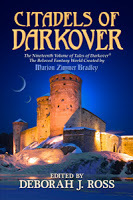 I urge anyone in a situation that's remotely close to my own to keep working on their creative pursuits, no matter how long it takes. It matters. It makes you feel better, more whole, like the person you were before tragedy struck. And it reminds you that you can still do things…that you aren't incapable…and that your life isn't completely over, even though it has altered irrevocably and permanently.
I urge anyone in a situation that's remotely close to my own to keep working on their creative pursuits, no matter how long it takes. It matters. It makes you feel better, more whole, like the person you were before tragedy struck. And it reminds you that you can still do things…that you aren't incapable…and that your life isn't completely over, even though it has altered irrevocably and permanently.My late husband would be happy I'm still working on my writing. And it's because of him that I can believe in myself long enough to do things like write this essay. I know that unconditional love is rare, and the true meeting of the minds he and I had is rarer still. I cannot deny that love, nor can I betray his trust and belief in me, by turning my face to the wall and giving up.
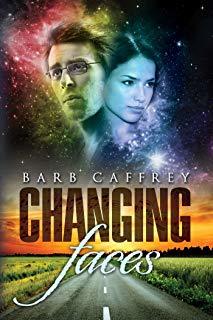
Barb Caffrey has written three novels, An Elfy on the Loose (2014), A Little Elfy in Big Trouble (2015), and Changing Faces, and is the co-writer of the Adventures of Joey Maverick series (with late husband Michael B. Caffrey) Previous stories and poems have appeared in Stars of Darkover, Citadels of Darkover, First Contact Café, How Beer Saved the World, Bearing North, And Bedlam's Edge (with Michael B. Caffrey).

Published on June 17, 2019 01:00
June 14, 2019
Short Book Reviews: A Transgender Heroine in a Dystopic World
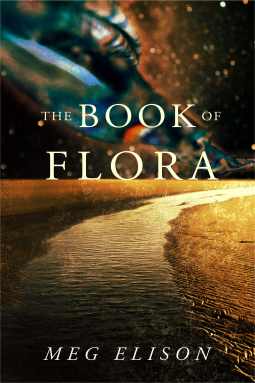 The Book of Flora(The Road to Nowhere, Book 3), by Meg Elison (47North)
The Book of Flora(The Road to Nowhere, Book 3), by Meg Elison (47North)I loved the first book in this trilogy (The Book of the Unnamed Midwife), the “origin” story of the collapse of civilization when most women die in a plague, and the heroism of the unnamed protagonist, who records her survival – and transmits her midwifery skills to ensure the next generation. Although I was uneasy about the portrayal of men as either bullies/gangleaders/rapists or gay, I went along with it for the sake of the story, which was as gripping (it won the Philip K. Dick Award) as it was grim. The second installment, The Book of Etta, was also grim, for many of the same reasons, but intrigued me with its treatment of LGBTQ folks in a world where controlling women’s bodies and maximizing their fertility are the keys to humanity’s survival.
Flora, a transwoman and silk weaver from Etta, is the central character in the third book. The story is just as dramatic, with a cast of intriguing characters, strong narrative prose, and a nice balance of pacing. Yet I found myself with increasing resistance to the portrayal of men and of relations between the sexes (however many sexes there are). Some of this may have been due to recently reading several of Alexander McCall Smith’s The Number One Ladies Detective Agencynovels, set in Uganda, which include some of the most genuinely good, kind men in contemporary literature. Maybe America goes the way of savagery, but it was hard for me to imagine someone like Obed Ramotswe or Mr. J.L.B. Matekoni behaving that way. Afrofuturism may point the way to a compassionate path through dystopia. At any rate, The Book of Flora kept me turning the pages, but it isn’t a world I’d ever want to live in, which is not the purpose of literature, anyway. I’m glad to have ventured into Elison’s dark, terrifying future, and see this trilogy as an important contribution to the examination of power, sex, gender, and culture.

Published on June 14, 2019 01:00
June 12, 2019
Today's Moment of Art
Published on June 12, 2019 01:00
June 11, 2019
A Rose to Sweeten Your Day
Sarah (adult daughter living with us) is in charge of flower arrangement. Our roses have been very happy! This blossom is about 6 inches in diameter.
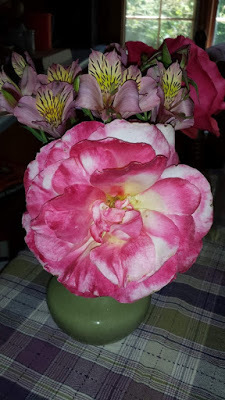



Published on June 11, 2019 01:00







